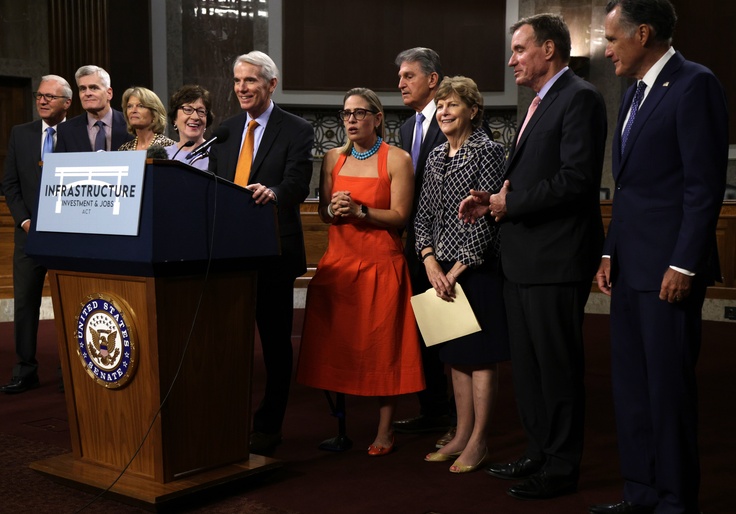
The bipartisan infrastructure agreement contains billions of dollars to remedy supposed racial injustice and combat climate change.
The Washington Free Beacon obtained a Messaging Document circulating among Senate offices to rally support. Much of the document, which is aimed at winning over skeptical GOP lawmakers, appears to be taken word-for-word from a Biden administration fact sheet posted on the White House website on Wednesday.
Much of the highlighted spending aims to remedy discriminatory policies of the past. Part of the $110 billion earmarked for rebuilding roads and bridges is dedicated to fixing allegedly racist projects that “divided” black communities.The proposal specifically names highways such as I-81 in Syracuse, New York, that would be rebuilt around black communities, rather than through them. Secretary of Transportation Pete Buttigieg previously said that “there is racism physically built into some of our highways.”
Thousands of public school buses, according to the document, would be replaced with “zero emission vehicles” as part of a $7.5 billion effort to “modernize” the country’s transportation. These new buses “will benefit communities of color since these households are twice as likely to take public transportation,” according to the document.
The proposal advanced in the Senate Tuesday night with a vote of 67-32. Every Democrat voted “yes,” as did 17 Republicans, including Minority Leader Mitch McConnell (R., Ky.). With two-thirds support, the deal is expected to pass the Senate without a GOP filibuster although it faces steep obstacles in the House.
While the bill has the support of McConnell, not all Republicans are on board. Former president Donald Trump lashed out against Republicans who supported the deal, calling Sen. Mitt Romney (R., Utah), who led negotiations between the two parties, a “SUPER RINO.”
“This will be a victory for the Biden administration and Democrats, and will be heavily used in the 2022 election,” said Trump. “It is a loser for the USA, a terrible deal, and makes the Republicans look weak, foolish, and dumb.”
House Democrats, who hold a slim majority, can only afford losing a few votes. Already, Democrats like Rep. Pramila Jayapal (D., Wash.) said “the votes of Congressional Progressive Caucus members are not guaranteed on any bipartisan package until we examine the details.”
The document boasts of the “largest investment in clean energy in history,” which includes building a new “clean, 21st century electric grid” and billions of dollars “for supply chains for clean energy technologies.” The Department of Energy would also be tasked with creating a “digital climate solutions report, including potential for use of artificial intelligence as a climate solution.”
Residents along Amtrak’s Acela corridor will enjoy $6 billion for track maintenance, as part of the “largest federal investment in public transit in history.” Another $60 billion will be given for general passenger and foreign rail funding.
The document also proposes a variety of other ambitious initiatives, including the replacement of “all of the nation’s lead pipes.”
“Currently, up to 10 million American households and 400,000 schools and child care centers lack safe drinking water,” the messaging document says. “The deal’s $55 billion investment represents the largest investment in clean drinking water in American history, including dedicated funding to replace lead service lines. … It will replace all of the nation’s lead pipes and service lines.”
A separate document obtained by the Free Beacon explains how the government will finance the new spending. Most of the sources of revenue appear to be from a variety of accounting tricks, such as the $2.9 billion “from extending available interest rate smooth options for defined benefit pension plans.” Those who support the plan expect another $28 billion to come from “applying information reporting requirements to cryptocurrency.”
The largest portion of funding comes from the “repurposing of certain unused COVID relief dollars,” totaling $205 billion. Another $53 billion comes from “certain states returning unused enhanced federal [unemployment insurance] supplement.”